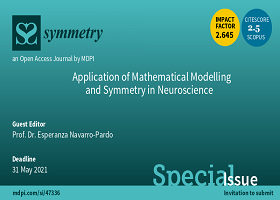- 2.2Impact Factor
- 5.3CiteScore
- 16 daysTime to First Decision
Application of Mathematical Modelling and Symmetry in Neuroscience
This special issue belongs to the section “Life Sciences“.
Special Issue Information
Dear Colleagues,
This Special Issue of Symmetry features articles about the application of mathematical modelling and symmetry in neuroscience, focusing on the multidisciplinary approaches of cognitive development throughout the life span. First, we are interested in studying cognitive development as a field of neuroscience and psychology which includes, among others, information processing, executive functioning and problem solving, perceptual skills, attention changes, language, brain development, metacognition, socio-emotional cognition, cognitive reserve, and cognitive frailty, analyzed both empirically and theoretically in order to evaluate how human beings think, understand, and process the world around them.
In addition, another of our goals is to achieve a better understanding of successful cognitive aging, as it is currently a central issue in the field of public health. We are also interested in describing the importance of studying cognitive development in relation to how not only age but also gender modulate cognition, which may involve biological and cognitive differences between men and women and be reflected in cognitive functions with advantages in certain domains for each gender (i.e., spatial and mathematical skills, emotional and verbal skills, etc.). Finally, we are also interested in testing the influence of psychosocial variables on cognitive development (education level, work activity, social support, lifestyle, psychological wellbeing, physical activity, etc.).
We encourage researchers to apply a wide range of statistical and mathematical tools, and in particular to develop mathematical and statistical models including the concept of symmetry for a better understanding of such a complex phenomenon as cognitive changes throughout life.

Prof. Dr. Esperanza Navarro-Pardo
Guest Editor
Manuscript Submission Information
Manuscripts should be submitted online at www.mdpi.com by registering and logging in to this website. Once you are registered, click here to go to the submission form. Manuscripts can be submitted until the deadline. All submissions that pass pre-check are peer-reviewed. Accepted papers will be published continuously in the journal (as soon as accepted) and will be listed together on the special issue website. Research articles, review articles as well as short communications are invited. For planned papers, a title and short abstract (about 250 words) can be sent to the Editorial Office for assessment.
Submitted manuscripts should not have been published previously, nor be under consideration for publication elsewhere (except conference proceedings papers). All manuscripts are thoroughly refereed through a single-blind peer-review process. A guide for authors and other relevant information for submission of manuscripts is available on the Instructions for Authors page. Symmetry is an international peer-reviewed open access monthly journal published by MDPI.
Please visit the Instructions for Authors page before submitting a manuscript. The Article Processing Charge (APC) for publication in this open access journal is 2400 CHF (Swiss Francs). Submitted papers should be well formatted and use good English. Authors may use MDPI's English editing service prior to publication or during author revisions.
Keywords
- cognitive psychology
- higher cognitive functions
- lifespan
- neuroscience
- statistics and mathematical modelling
- symmetry

Benefits of Publishing in a Special Issue
- Ease of navigation: Grouping papers by topic helps scholars navigate broad scope journals more efficiently.
- Greater discoverability: Special Issues support the reach and impact of scientific research. Articles in Special Issues are more discoverable and cited more frequently.
- Expansion of research network: Special Issues facilitate connections among authors, fostering scientific collaborations.
- External promotion: Articles in Special Issues are often promoted through the journal's social media, increasing their visibility.
- e-Book format: Special Issues with more than 10 articles can be published as dedicated e-books, ensuring wide and rapid dissemination.


